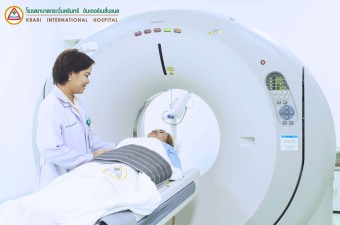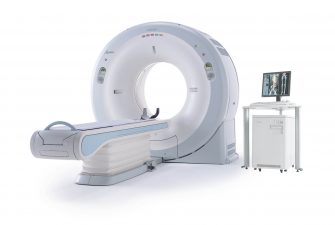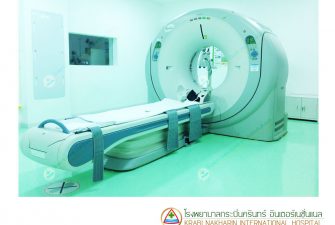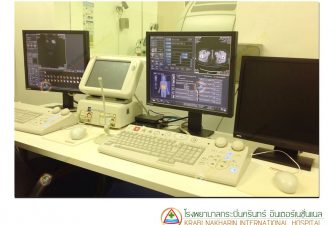64-slice CT scan
What is CT scan?
CT scan is the diagnosis to identify the organs’ abnormality through X-irradiation. X-irradiation will be irradiated transversely into the organ which CT scan will let the computer create the specific organ’s figure accurately.There are the indications of the diagnosis as follows:
1. Diagnose the tumors in the various organs including tumor’s position and size
2.Diagnose the tumor’s contagion to the nearby lymph nodes
3.Diagnose the Blood Congestion in brain, abdominal cavity, and pelvic
4.Diagnose the vascular disorders such as aneurysm, Atheroma, etc.
5.Diagnose the disorders of bones and joints such as broken bone, loose fracture, inflammation, etc.
CT scan is currently divided into 4 systems
1.Brain System includes the computerized X-Ray of brain, eyes, throat, hypophysis, salivary gland, etc. which the patient must be injected the contrast medium (Angiography) to vein for help to sight clearly the organs.
2.Abdominal Cavity and Chest Systemincludes the computerized X-Ray of abdominal cavity and pelvic which the patient must drink the contrast medium/drinking water, and/or use the contrast medium/drinking water to enema for distinguish the vagina from other tissues in order that depending on the discretion of the radiologist in addition to the patient must be injected the contrast medium (Angiography) to vein for help to sight clearly the organs.
3.Muscle, Joint, Bone, and Vertebra System is frequently used to diagnose the oncosis of muscle and bone or inflamed joints, and the anatomical description of vertebra which CT scan can diagnose the osteopathy better than the general X-Ray.
4.Vascular Systemincludes the computerized X-Ray of cerebrovascular, cardiovascular, aorta, renal artery, and leg arteries, etc. which the patient must be injected the contrast medium (Angiography) to vein for help to sight clearly the organs.
Before CT Scanning, the patients should
1.No food and drink before scanning for 4-6 hours
2.Sign on the permit to the doctor can diagnose and inject the contrast medium
3.for the children, the patients must be given General Anesthesia while scanning which the children’ s parents have to sign on the permit
4. The patients with underlying diseases should inform immediately to the nurse such as Asthma, Allergy, Nephropathy, Cardiopathy, and Diabetes mellitus.
5.The patient should has the relative at least one to come with on the scanning date
6.The patient must change your clothes to the clothes of scanning room, and you have to remove the accessories from the specific organ of scanning
7.In case that the patient will be scanned the endoperitoneal, you must drink 3-4 glasses of contrast medium or drinking water before scanning
The diagnosed steps of CT scan
1. The nurses or staffs let the patient to the scanning room, and arrange the suitable posture. In the case that the patient will be scanned the lower abdomen, you will be injected 100-200 cc. of contrast medium through enema. In case of female, the patient must insert the tampon into the vagina because it is easy to distinguish the vagina from other tissues.
2. The patient will be injected the contrast medium into vein because it can help to sight clearly the X-Ray figure. You may have the flushes symptom about a few minute while inject the contrast medium which this symptom will disappear soon.
3. The patient will hear the computerized X-Ray’s sound, so you should not move a muscle, and follow strictly the guidance of radiological technologist
4. If the patient has the abnormal symptoms such as oppression in the chest, gasping, rash, nausea, vomiting, etc., you must inform the nurse or staff immediately.
The suggestions after CT scanning
1. The patient can eat normally and you should drink 1-2 liters of water within 24 hours for help to exudate quickly the contrast medium from body.
2. If the patient has the abnormal symptoms after scanning such as oppression in the chest, gasping, rash, nausea, vomiting, etc., you must tell immediately to the nurse or staff.
The precautions of CT scanning
1. The patients have the history of allergy, asthma, seafood allergies, and contrast medium allergy, you have to inform the nurse before scanning.
2. The patient who has nephropathy or renal abnormalities, should consult with the doctor before undergo the procedure.
3. in case of the pregnant patients or suspected to be pregnant, you have to tell the doctor, nurse, or radiologist before scanning.
_______________________
CONTACT US
Krabi Nakharin International Hospital
1 Pisanpob Rd., Paknam Sub-district, Muang Krabi District, Krabi 81000
![]() www.krabinakharin.co.th
www.krabinakharin.co.th
![]() 075 626 555
075 626 555
![]() facebook.com/krabinakharin
facebook.com/krabinakharin





